The entry of strong coffee brands like Starbucks forever changed the coffee culture in India. Introducing unique coffee flavors to India, it also had a large-scale environmental impact. In the past decade, we have recognized the ill-effects of unsustainable living and have moved on to greener pastures. It seems that many coffee connoisseurs took note of this, leading to a rise in local coffee shops and brands that launched a new movement within the Indian coffee sub-culture- the rise of sustainable gourmet coffee brands that are home-grown, Fair Trade, and pledge Rain Forest Alliance.
Among various steps to reduce your carbon footprint, choosing a sustainable coffee brand is of utmost importance. This is our top 7 list of sustainable coffee brands that are leading the Indian market by example.
1. Araku Coffee
The sustainable coffee brand, Araku Coffee, establishes a strong connection with the environment where its coffee is grown. It first started as a non-profit venture where the management of a government-established, marked land for development and funding for the locals was done by the Naandi Foundation. The signature Araku Coffee grows in the Eastern Ghats’ Araku Valley.
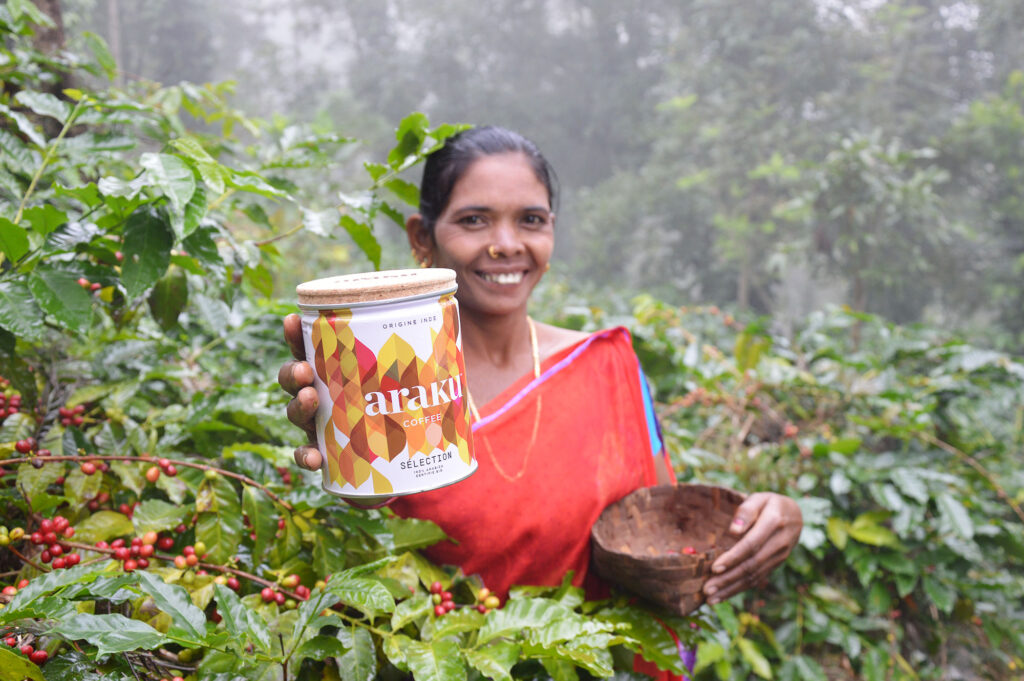
Grown in this valley are organic, terroir-based coffee that we can assure you the richness of the taste of. Araku does not discount the sustainability of the farming process either. The brand ensures the growth of coffee plantations shaded by silver oak, mango, and eucalyptus trees– fulfilling its promise to the government of maximising fundings for the locals without compromising the valley’s ecological health. It is the perfect example of a brand having a rainforest alliance while maintaining fair trade.
Araku Coffee offers artisanal beans based on growing conditions like Microclimate, Early Harvest, High Altitude, etc. They also provide coffee in its various forms such as coffee beans, ground coffee, and coffee pods. It is artisanal coffee at its finest- one that proves that working with nature than against creates the best produce.
2. Blue Tokai Coffee Roasters
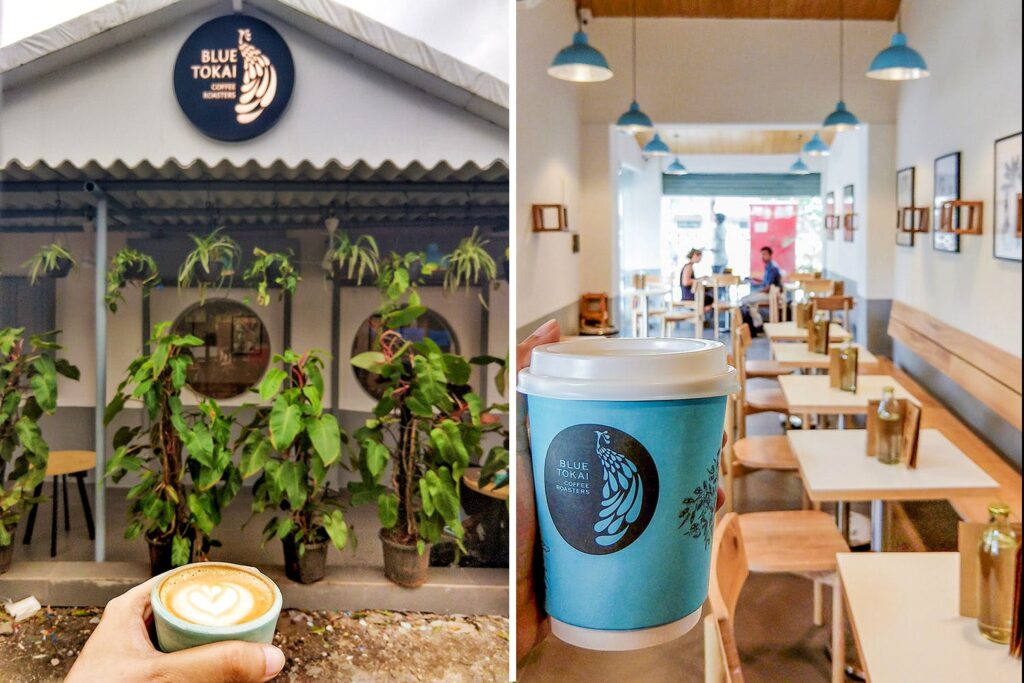
You might have spotted this name on a cafe door in Mumbai, but it’s more than a coffee shop. Blue Tokai is representative of the cultural shift around specialty coffee that has taken place in India in recent years. It has established itself as entrepreneurs with a mission to make specialty coffee beans available for order, in-store purchase, and to drink ready-made while admiring the city from the glass windows of its cafe.
Blue Tokai’s strength as a sustainable brand lies in its commitment to eliminating the ‘middleman’ who takes credit from farmers. The taste of the beans is richer and stays fragrant well after its arrival at the doorstep of its cafes.
Blue Tokai Coffee Roasters provides coffee in all shapes and sizes. From roasted coffee beans to coffee capsules, they ensure that their products are eco-friendly. Attempting to justify regular coffee capsules as eco-friendly is challenging, but Blue Tokai’s capsules are biodegradable. Their most popular launches include the Attikan Estate, Vienna Roast, Dhak Blend, and Silver Oak blend.
3. Third Wave Coffee


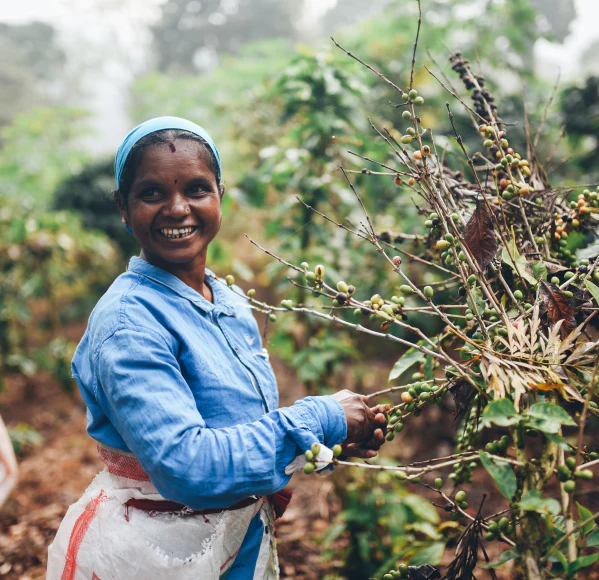
Image Source: Third Wave Coffee
Founded in 2017 by Ayush Bathwal, Anirudh Sharma and Sushant Goel, Third Wave Coffee is a QSR coffee chain that boasts of more than 90 stores across India. Based on the principles of Happiness, Innovation and Inclusivity, and with a strong presence across India Third Wave Coffee wants to be a part of your everyday routine. And with a recent Series C investment of USD 35 million, this coffee brand is here to stay.
Their Process: Third Wave Coffee Roasters perfects every step in the coffee bean’s journey, from seed to cup. Their core philosophy centers on care, which extends beyond creating the perfect cup of coffee to encompass the entire ecosystem supporting it.
They believe in direct sourcing from farmers, fostering sustainable and ethical practices. The beans are roasted in-house using a state-of-the-art roaster, and they carefully grind them to preserve their rich flavors.
Characteristics of Third Wave Coffee: Their commitment lies in the details of coffee consumption, ensuring it’s a delightful part of your daily experience. With quality roasting and direct sourcing from farms in Chikmagalur and the Nilgiris, they emphasize fair trade and ethical pricing.
Their Farms: Third Wave Coffee Roasters proudly sources coffee from lush farms in Chikmagalur, notably the Baarbara Estate, which boasts over 120 years of experience. Here, shade-grown coffee is manually picked and sorted, ensuring only the finest flavors and aromas reach your cup.
At Third Wave Coffee Roasters, their dedication to care, quality, and sustainability shines through every sip of their coffee, delivering an exceptional coffee experience.
4. Flying Squirrel
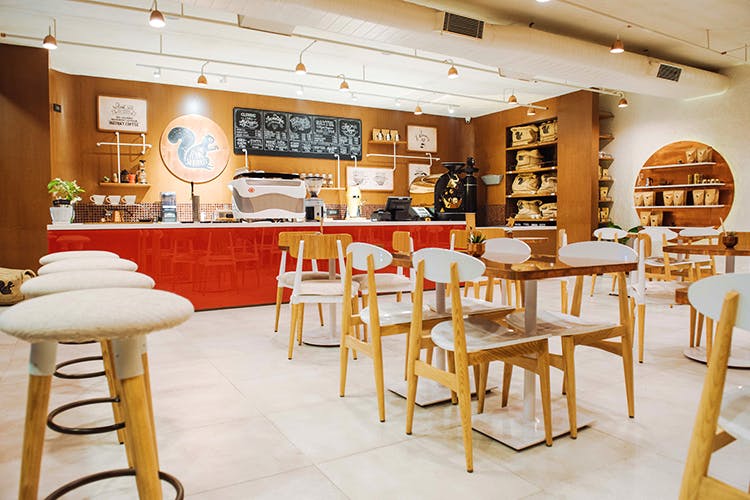
Flying Squirrel Coffee is a part of the new movement created by sustainable coffee start-ups in India that advocated against coffee found on supermarket shelves. Flying Squirrel started with sourcing their coffee sustainably, and did so by making sure that they source their coffee beans from the Thammaiah family estate in Kodagu, Karnataka. It is a 150-acre farm that commits itself to an extensive process of farming, growing, hand-picking, drying, and husking of the beans for them to ripen to ‘exact perfection’. The flying squirrel website clearly describes their well-defined artisanal coffee range. They rate each product on a scale that measures its roast levels, ranging from light roast to dark roast. The brand enables consumers to select the grinding size of the beans based on the method of brewing they prefer. From Aeropress to Turkish brewing- The Flying Squirrel has got you covered.
5. Halli Berri
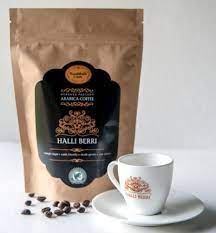
Halli Berri is a woman-led, conscious coffee brand that works towards providing fresh coffee beans to one’s door steps. It provides its consumers a taste of what a UNESCO biodiversity hotspot can produce without abusing its ecology. The brand collaborates with nonprofit conservation efforts and job creation in the local community, boosting the villagers’ economy.
Halli Berry aims to provide fresh, sustainable, and biodiverse artisanal caffeine products to the Indian market. It follows sustainable methods such as shade-grown coffee, small batch procedures, and cherry-picked for the best user experience. Naturally, its price reflects support for the local economy and boutique-level artisanal coffee. However, this gourmet coffee brand with a honey-dew flavour is one to not miss while exploring Indian home-grown coffee brands.
6. Black Baza Coffee
Black Baza Coffee focuses on artisanal coffee, directly aiding forest and wildlife conservation through its sales. Arshiya Bose, the founder of Black Baza Coffee, connected with a group of coffee producers who were looking to convert to sustainable farming practices but did not meet any potential partners to collaborate with. As a graduate in sustainable coffee production, she had no issues in kickstarting her relationship with the coffee farmers. She ensured prevention of tree-felling by following shade-farming, promotion of indigenous tree species, and stopping usage of chemical pesticides and fertilisers.
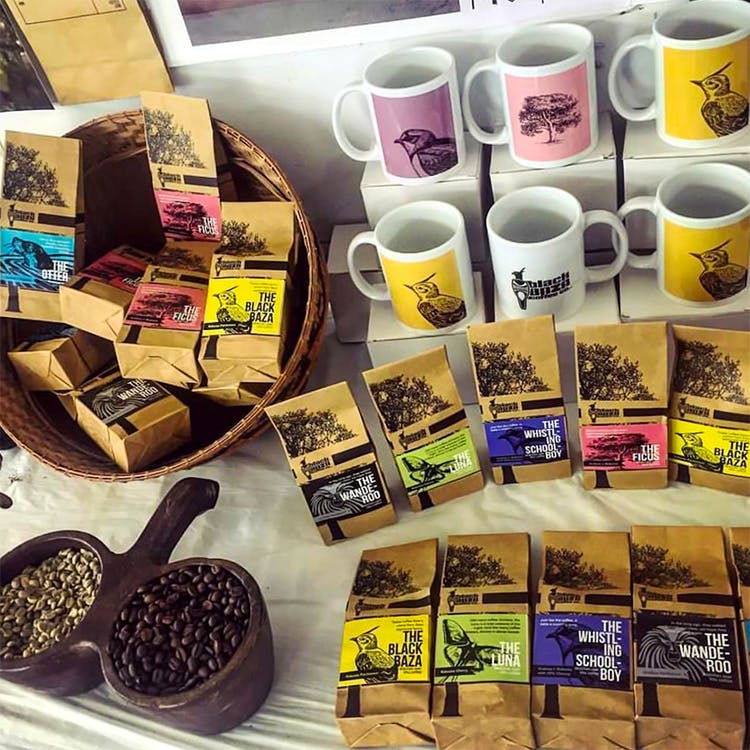
Black Baza Coffee provides two main types of coffee: Arabica, and Robusta. They also provide mixtures of the two and a separate mixture where ‘Chicory’ is mixed with the two coffee bean types. They label each of their ten options from their range according to their level of roasting of the beans- each specification enriching the coffee bean flavour for the customer to enjoy on a nice morning.
7. Koinonia Coffee Roasters
Koinonia Coffee is a Greek word for ‘community’- and it is an excellent glance into what this gourmet coffee brand stands for. The founders describe the effort of Koinonia as ‘the creation of a community around ritualistic coffee consumption’ where every single person in. Koinonia ensures that the sustainable brand supports small farmers by maintaining relationships with them where the connection to the coffee farmers is direct and uninterrupted by third-parties which can in-turn reduce the control of the brand over the ethicality of the production processes before the third-party steps in. Besides ensuring ethical compensation for the work of the coffee farmers, Koinonia also ensures a steady growth in the quality of coffee production to help customers ‘to continue demanding for good quality coffee‘ that maintain fair trade.
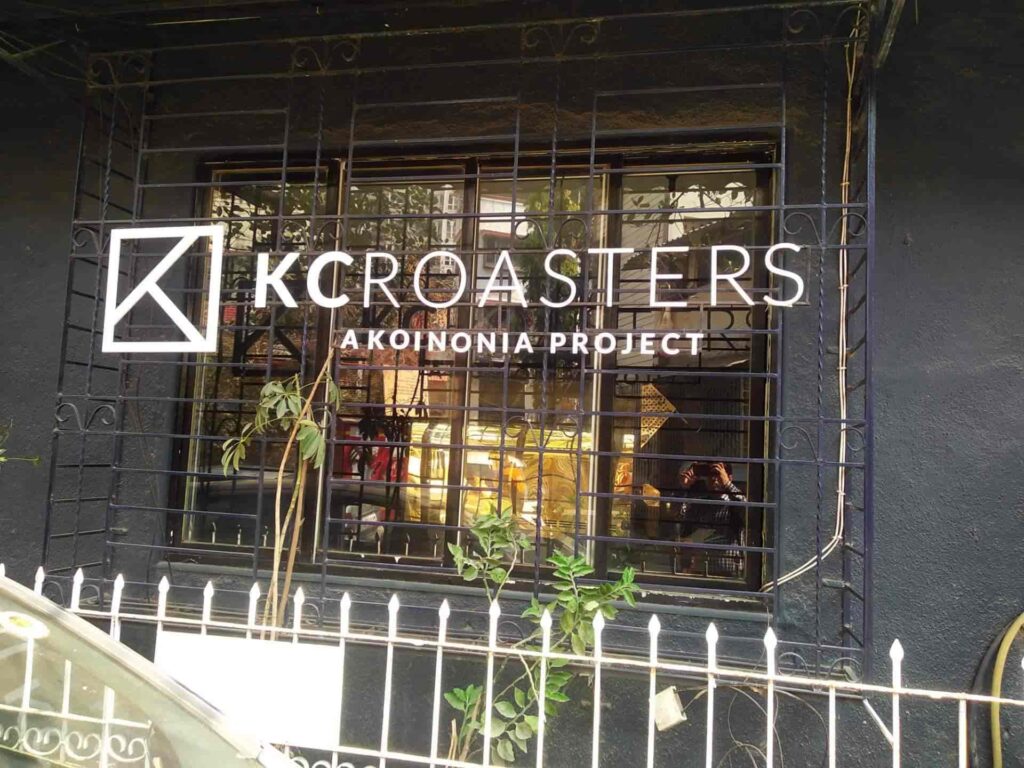
Koinonia, besides having its regular coffee mixes, also produces specialty coffee. From taster packs to gifting options, this Indian specialty coffee brand has you covered for any occasion that you would drink a good, aromatic cup of coffee to. They offer customizations like bag size (120g, 340g, 840g) and various grind sizes for all brewing methods. Stanmore is its top flavour acclaimed by many Indians.
Bonus: The Indian Bean
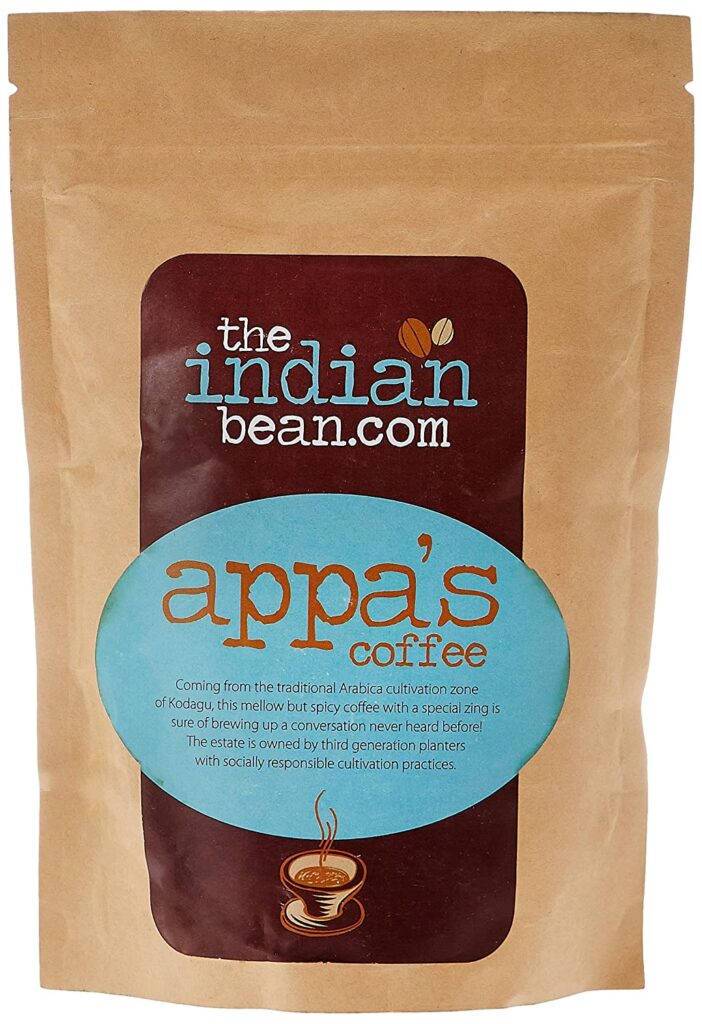
With a mission to provide gourmet coffee to the masses, Kunal Ross and his team conducted a research into plantations present in Nepal, Kodagu and Kodi. While ensuring that all of its coffee is home-grown, i.e sourced within the country in order to support the country’s rural economies, it has automatically ensured the provision of a large spectrum of rich flavors grown in different states. This resulted in the growth of The Indian Bean as a start-up to a coffee brand with rich and complex flavours born from the rich biodiversities that the brand’s plantations exist in.
The Indian Bean has a wide range of coffee types and coffee product types that are priced at affordable rates for even the most avid drinker of caffeinated drinks. According to their customer reviews, their best rated flavours are namely Appa’s, Frowners, Watapi, Monkey Bittin and Malnad. You can purchase this brand’s products on popular online platforms like Amazon and Big Basket.
Conclusion
As conscious consumers who can and have changed the market for the better in the past, it is important for us to continue to take steps to live sustainably in various aspects of our lives- no matter how small they might seem. After all, the coffee industry is a big one, and India is one of the largest producers of coffee- leaving a lot of space for environmental and humanitarian activism to take place and thrive with the support of the market. And as a treat, you get to embark a journey of exploration of each of these brands -a guaranteed delicious ride!










